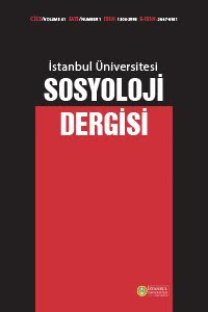DİLENCİLİK YOKSULLUK İLİŞKİSİ
Dilencilik nedir? Dilencilik olarak ifade bulan davranış biçimi, yoksulluğun geniş coğrafyasında asli bir unsur mudur yoksa yoksulluğun toplumca pozitif çağrışımlara sahip veçhesini kullanan yoksulluk dışı bir kategori midir? Temsil ettiği yoksulluk biçimini söz ve davranış kalıplarıyla toplumun algı sahasına taşıyarak pozisyonunu meşrulaştırmaya çalışan dilenci/dilencilik, yoksulluk alanında hayatiyet bulan bir dublörlük biçimi midir? Sosyo-ekonomik açıdan monolitik bir gövdeden mi oluşmaktadır? Dilenciliğin toplumsal, ekonomik ve dinsel zeminle ilişkisi nasıl formüle edilebilir? Bu çalışmanın amacı, yoksulluk algımız içine yerleşen toplumsal, dinsel ve vicdani etkenlerle desteklenerek varlığını sürdüren dilenciliğin yukarıda belirtilen sorular ışığında yoksulluk sınırları/halleri içindeki konumunu ya da kimliğini İstanbul örneğinde elde ettiğimiz veriler ışığında sorgulamaktır. Dilenciliğin yoksulluk dünyasından devşirdiği söz ve pratiklerle iç içe geçmiş pozisyonunu, yoksulluk evreninin barındırdığı donelerle karşılaştırarak vuzuha kavuşturmayı hedefleyen bu çalışma söz konusu hattaki belirsizliğe açıklık getirmeyi amaçlamaktadır.
Anahtar Kelimeler:
Dilencilik, yoksulluk, yoksulluk algısı, İstanbul'da dilenciler
THE RELATION OF BEGGARY AND POWERTY
What is beggary? Is the act of beggary an essential component of the vast field of poverty or is it a category out of poverty that abuses the positive feelings of society towards poverty? Is the beggar/beggary that tries to justify its position by carrying the form of poverty it represents through expression and behavior forms to the perception of the society a sort of stunt that is vital in the field of poverty? From a socio-economic perspective is beggary composed of a monolithic body? How can the relationship of beggary with the social, economic, religious, and political ground be formulated? The aim of this dissertation is to question the position or the identity of beggary – which continues to exist supported by the religious, ethical, and moral factors embedded in our perception of poverty – in the limits/conditions of poverty in the context of the questions raised above witt the results gathered through a survey conducted in Istanbul. Through a comparison of data on the universe of poverty with the position of beggary - interlocked with the expressions and practices gathered from the world of poverty - this study aimes to shed light on the uncertainty in the topic.
Keywords:
Beggary, poverty, perception of poverty, beggars in Istanbul.,
- ISSN: 1304-2998
- Başlangıç: 2020
- Yayıncı: İstanbul Üniv. Edebiyat Fak. Sosyoloji Böl.
Sayıdaki Diğer Makaleler
İZCİLİĞİN TÜRKİYE'YE GELİŞİ VE GÜNÜMÜZDEKİ GÖRÜNÜMÜ
KAPIYA GELENİ GERİ ÇEVİRMEME: İSTANBUL ESNAFININ DİLENCİLİK OLGUSUNA BAKIŞ AÇISI
TANZİMAT DÖNEMİNDE YURTDIŞINA ÖĞRENCİ GÖNDERME OLGUSU VE OSMANLI MODERNLEŞMESİNE ETKİLERİ
Bulgaristan'da Sosyoloji Çalışmaları: Projeden* Topluma
Sevim HACIOGLU, Sevim HACIOĞLU
